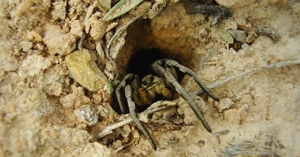
6 Fast Facts About 3 Freaky Spiders
What kind of spiders live in Arkansas?
The (terrifying) truth is, there are over 40 species of spiders native to Arkansas. Three of these species include the wolf spider, black widow, and Texas brown tarantula (sometimes known as the Arkansas chocolate tarantula, the Missouri tarantula, or the Oklahoma brown tarantula). Keep reading to learn some weird and freaky facts about these spiders!
Black Widow
FUN FACT: The block widows bite isn’t as deadly as some may fear, but it is rumored to be 15 times stronger than the bite of a rattlesnake!
FREAKY FACT: How did the black widow get its name? In captivity, the female black widow will kill and eat the male spider after mating. However, this is mostly observed in lab conditions, so we aren’t sure if this practice is common for black widows in the wild.
Texas Brown Tarantula
FUN FACT: Male tarantulas rarely live past maturity, but females have been observed to live up to 40 years! There’s some speculation on whether their lifespans may actually be longer, but most studies don’t last this long so there’s little data to back this.
FREAKY FACT: This spider is the largest spider native to the southern United States and can grow to be 1.4 to 2 inches long with a legspan of up to 6 inches long!
Wolf Spider
FUN FACT: Wolf spiders are common in our area, but the truth is that they can live just about anywhere! Wolf spiders have been found on mountaintops, in grasslands and suburban lawns, and even inside volcanic lava tubes!
FREAKY FACT: Wolf spiders are one of many hunting varieties of spiders. As such, they don’t spin a web to catch their food—instead, they stalk their prey and pounce on them like a wolf!
What attracts spiders to my home?
There are three common things your home provides that are attractive to spiders and many other pests who may seek out a house for shelter.
-
Shelter. Spiders seek out shelter to lay their eggs. They’ll generally go out of their way to avoid interactions with humans, so you’ll typically find more spiders in hidden areas such as garages, outdoor sheds, and the attic.
-
Moisture. Like all living organisms, spiders need water to survive. A source of water can be something as small as a dripping outdoor faucet or even water in dishes in the sink.
-
Food. Spiders are attracted to porch and patio lights because they know other insects are drawn to lights—meaning any source of light is a beacon for a potential meal.
Let Hopper Termite & Pest take care of your spider worries. Call us today at (870)425-4122 or contact us online for effective spider control!
